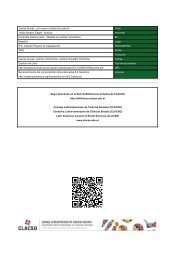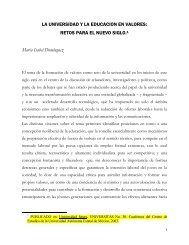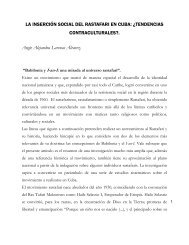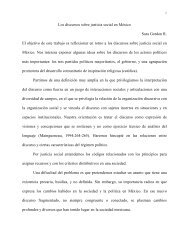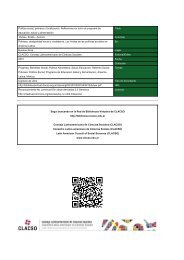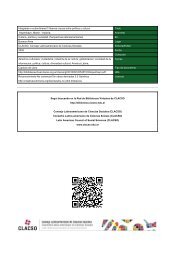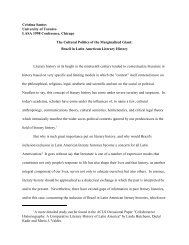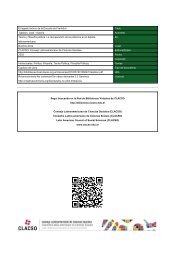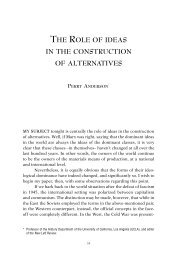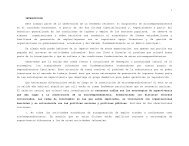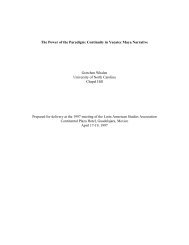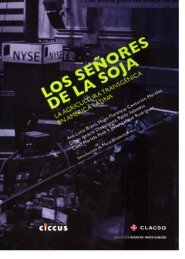hegemony and imperialism in the international system - Clacso
hegemony and imperialism in the international system - Clacso
hegemony and imperialism in the international system - Clacso
Create successful ePaper yourself
Turn your PDF publications into a flip-book with our unique Google optimized e-Paper software.
NEW WORLDWIDE HEGEMONY. ALTERNATIVES FOR CHANGE ANDSOCIAL MOVEMENTS<br />
S h a k e s p e a r e ’s reflection, when he makes one of his characters say, “Yo u<br />
take my life when you do take <strong>the</strong> means whereby I live,” seems highly<br />
fitt<strong>in</strong>g. The predatory nature of capitalism, exacerbated <strong>in</strong> its current<br />
phase, has led precisely to this po<strong>in</strong>t: depriv<strong>in</strong>g three quarters of<br />
humanity of <strong>the</strong>ir livelihood <strong>and</strong> destroy<strong>in</strong>g <strong>the</strong> environment that made<br />
it possible for human life to appear <strong>and</strong> ma<strong>in</strong>ta<strong>in</strong> itself on this planet.<br />
A civilization which <strong>in</strong> <strong>the</strong> name of eff i c i e n c y, rationality <strong>and</strong> progress<br />
slowly <strong>and</strong> silently carries out <strong>the</strong> biggest genocide known <strong>in</strong> <strong>the</strong> history<br />
of humanity. Every year near forty million people, most of <strong>the</strong>m children,<br />
die of hunger <strong>and</strong> curable diseases. In o<strong>the</strong>r words, <strong>in</strong> just one<br />
year capitalism annihilates more than half <strong>the</strong> number of victims<br />
caused by <strong>the</strong> Second World War over six years. The large social<br />
movements that today challenge this situation do so on <strong>the</strong> basis of <strong>the</strong><br />
conviction that o<strong>the</strong>r world is not only possible but also necessary <strong>and</strong><br />
urgent. I shall attempt, <strong>in</strong> <strong>the</strong> follow<strong>in</strong>g pages, to set forth a brief summary<br />
of <strong>the</strong> debates held with<strong>in</strong> <strong>the</strong> framework of this event. The<br />
emphasis will be placed both on <strong>the</strong> ma<strong>in</strong> areas of agreement <strong>and</strong> on<br />
<strong>the</strong> issues under dispute.<br />
A new phase?<br />
There is an extremely wide consensus <strong>in</strong> <strong>the</strong> sense that <strong>the</strong> world<br />
imperialist <strong>system</strong> has entered a new phase <strong>in</strong> its evolution. This transition<br />
didn’t escape <strong>the</strong> notice of its spokespeople <strong>and</strong> ideological representatives,<br />
who hurried to endow this new stage with a name that<br />
underl<strong>in</strong>ed <strong>the</strong> dazzl<strong>in</strong>g features of its appearance while carefully hid<strong>in</strong>g<br />
its deepest essence: globalization. The more strik<strong>in</strong>g aspects of this<br />
process seem to substantiate <strong>the</strong> idea of an <strong>in</strong>creas<strong>in</strong>g globalization of<br />
productive processes <strong>and</strong> of <strong>the</strong> operation of <strong>the</strong> diverse markets.<br />
Never<strong>the</strong>less, <strong>the</strong> scope of this phenomenon has been extraord<strong>in</strong>arily<br />
exaggerated <strong>and</strong> nowadays <strong>the</strong> available research already demonstrates<br />
that <strong>the</strong> much trumpeted globalization –which <strong>the</strong> French correctly<br />
call mondialization, someth<strong>in</strong>g like “worldization,” to allude to<br />
<strong>the</strong> will-related, not at all natural, elements that boost it– is a phenomenon<br />
that acquires a different solidity depend<strong>in</strong>g on what is be<strong>in</strong>g<br />
talked about. The <strong>in</strong>ternational f<strong>in</strong>ancial <strong>system</strong> has, no doubt, been<br />
1 We have exam<strong>in</strong>ed this subject <strong>in</strong> Tiempos violentos. Neoliberalismo, globalización y desigualdad en<br />
América Lat<strong>in</strong>a, 2004 (1999), which <strong>in</strong>cludes a detailed bibliography on <strong>the</strong> issue.<br />
132



